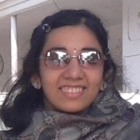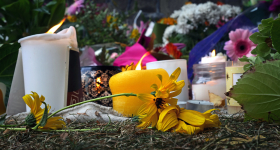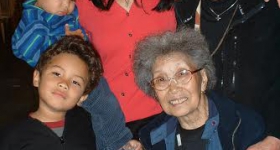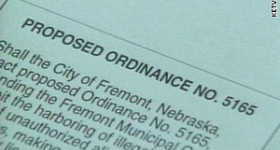Abandoned Funhouse by pingpongdeath
I've become rather blasé when it comes to distorted, disparaging representations of Asians. It's hard not to be, when that's our primary reflection in the funhouse mirror lens of American mass media. So I thought I was prepared, coming into this story, especially since I'd been warned.
But no warnings could have sufficed for something so heartbreaking, and utterly infuriating.
Radiolab is a popular radio show that's received an award for its "imaginative use of radio to make science accessible." Cohost Jad Abumrad is a MacArthur grant recipient. On September 24, they aired a 25-minute segment on Yellow Rain (link goes to an amended version). It began:
Today, we've been investigating the truth. The fact of the matter.
Don't give me this truth is relative crap ... if you look hard enough, you will find a truth, and that will resolve it for you ... and even if you don't find it, it's still out there.
But this next story complicates the idea.
The setup -- a knockdown fight pitting realism/positivism (Truth is the Holy Grail that we should all seek) against relativism/constructivism (what is this "truth" you speak of? It's all just different points of views: you say potato, I say flying saucer) -- presents a misleading dichotomy that obscures an urgent question: Who gets to decide these things, anyway? How does power affect the process of legitimizing narratives; how do society's underlying hierarchies shape the truths we hear?
It continues with the introduction of CIA officer Merle Prebbenow, who was posted "out in the sticks, out in the boonies. Somewhere in Southeast Asia."
There was a time when Southeast Asia automatically carried "jungle backwater" connotations. But I suppose in this postmodern era of multiple truths, it could also denote a lushly beautiful region with resilient cultures developing dynamic strategies of managing globalization. That's why framing is important. So CIA operative Prebbenow reiterates: "I ended up in this... remote jungle backwater, I guess is the best way to phrase it [chuckles]," and the narrative continues: "As much as Merle did not want to be there, this little backwater..."
Edward Said's Orientalism is still relevant thirty years after publication, I guess is the best way to phrase it.
#
According to Radiolab, during the Cold War, refugees emerged from the world's jungle backwater carrying horrific stories of chemical warfare. Ronald Reagan used their testimonies to re-order the production of chemical weapons, but some prominent scientists weren't fooled. They examined the allegedly contaminated samples, read accounts of those jungle backwater refugees, even quested into jungle backwaters themselves (not Laos, where the alleged chemical attacks were occurring, but let's not quibble). There, they proved once and for all that what had been raining down from the skies was bee shit, thereby averting catastrophe.
#
In the beginning, Radiolab promised us a complication to its search for the Truth. I naively expected it to have something to do with there being no consensus on the truth. As Tucker says: "whether or not toxin warfare agents were used in Laos and Cambodia between 1975 and 1983, and if so which ones, remains a mystery."
But this is, apparently, more complication than the show can handle, especially against the image of backwater Asian villagers cowering from bee droppings. The previous framing comes in useful here, because who knows, these Hmongs might still believe the world flat. But as rational, educated Americans, we know the (absolutely hilarious) Truth. We know because a Harvard scientist read their accounts, went to Thailand, discovered that Thai bees poop just like American bees, and concluded that thousands of refugees were suffering mass delusions.
So the stumbling block to Radiolab's search for the Truth isn't the contested nature of this (perhaps unprovable) theory, but those stubborn backwater refugees, personified by Eng Yang and his niece Kalia, who keep insisting they were attacked with chemical weapons:
Eng Yang (through Kao Kalia Yang): I speak to what I've seen, and there is no inkling in my mind, that those deaths were not caused by cholera or dysentry, it was chemicals that were killing my people. [..] I saw with my own eyes bee pollen on the leaves eating through holes. With my own eyes I saw pollen that could kill grass, could kill leaves, could kill trees.
Robert Krulwich (cohost): But he himself is not clear whether it's the bee stuff or whether it's other stuff, because there was so much stuff coming down from the skies.
Eng/Kalia: We know that there were chemicals being used against the Hmong in the mountains of Laos. Whether this is the chemicals from the bombs or yellow rain, chemicals were being used. It feels to him like this is a semantic debate, and it feels like there's a sad lack of justice, that the word of a man who survived this thing must be pitted against a professor from Harvard who has read these accounts.
Robert: But as far as I can tell, your uncle didn't SEE the bee pollen fall. Your uncle didn't SEE a plane. All of this is hearsay.
The interview lasted two hours. An edited five minutes are heard on the show. In one of his responses, Aaron Hokanson, Kalia's husband, wrote:
Eng described multiple times the Hmong centuries old familiarity with bees, bee behavior, and the location of bee dung. However, each time he would describe this the hosts discounted his knowledge suggesting that a "Harvard professor" had discovered yellow rain was not a chemical weapon. [...] From the beginning, and through the interview, Eng tried to talk about his experience of yellow rain. He tried to do this for two hours. In the final edits we are instead presented with a character, nothing like Eng, but everything like the stereotypes of an old man who "doesn't know better."
As sociologist Patricia Collins observed, "It is not that elites produce theory while everyone else produces mere thought. Rather, elites possess the power to legitimate the knowledge..."
#
Robert Krulwich, one of the host of the show, grew increasingly disrespectful toward my uncle’s experiences and his lack of formal education. I lost the reins on my emotions and I stopped the interview. This is of course the part that the show decides to end on... The story is billed as a search for Truth. I am a firm believer that the Truth belongs to those who’ve lived it. I am still processing the story they aired and all the information edited out...
Kao Kalia Yang is a professor, published author, and Hmong activist. But the framing is rational Americans versus backwater Asians, scientific truths versus ignorant, though perhaps necessary, delusions (Radiolab: "if yellow rain suddenly isn't a chemical weapon, that doesn't just invalidate the yellow rain, it negates their entire loss... But I also think the scientists are right, it's not a chemical weapon..."). So we're only introduced to Kalia, Eng Yang's translator niece.
#
Radiolab concludes by presenting their reflections. They were troubled by the interview (though not enough to give credence to Eng Yang's account), and discussed it for weeks (while developing latent mind-reading abilities.)
Some of their statements, like those excerpted below, still chill me.
Pat Walters [producer]: "What I'm hearing her say here, not having been in this interview, is 'quit focusing on this yellow rain stuff. because when you do that, you're shoving aside a much larger story. Namely, that my people were being killed."
Robert Krulwich: "That is exactly what she's saying. And that is wrong. That is absolutely... And to my mind, that is not fair to us. [..] It is not fair to ask us to not consider the other stories and the other frames of this story. The fact that the most powerful man in the world, Ronald Reagan, used this story to order the manufacture of chemical weapons for the first time in twenty years. If the United States were to manufacture chemical weapons again and use them, because the Russians supposedly had, then people would have died ugly deaths in the consequence of that. And that is not unimportant. That is hugely important. But that is not important to her. So should that not be important to us? [..] Her desire was not for balance. Her desire was to monopolize the story."
Krulwich doesn't just trivialize the attempted genocide of the Hmong, which is nothing new. There were times when it became politic for the US government to acknowledge Hmong lives and experiences -- when they required Cold War foot-soldiers, or weapons program justifications -- but now their politically inconvenient stories are rarely heard.
What's also missing from Krulwich's narrative is the napalm ("the most terrible pain you can ever imagine") dropped on millions of Vietnamese, Cambodian, and Laotian civilians. What's also missing is the devastation wrought by Agent Orange. Millions of documented deaths and counting; hundreds of thousands of children with birth defects and counting.
But the frame that matters, that is "hugely important" for us to keep in mind, is that three decades ago, some uneducated refugees stumbled out of their godsforsaken Asian jungles claiming to have been victims of chemical warfare, and their delusions could have led America to manufacture chemical weapons for the first time in twenty years. But thank god and science we were too rational to go down the route, because if (IF!) we had done so, people would have died ugly deaths as a consequence.
That a decade ago, such weapons had already been manufactured, and already been used, that millions had already died ugly deaths as a consequence, that this was a factor that led to the attempted genocide of the Hmong, that millions are still dying ugly deaths while we evade responsibility -- none of that is "hugely important" for us to keep in mind, lest we get carried away while listening to the desperate delusions of the stubborn, ignorant Asian jungle rube Eng Yang (known as a respected survivor of a horrific atrocity in places less rigorously scientific), lest we get carried away while listening to his niece's emotional, self-centered attempts to monopolize the issue.
What's hugely important isn't real but hypothetical pain; what's hugely important isn't real but hypothetical consequence. What's hugely important isn't lived history, but an Orientalist, ethnocentric framing and narrative of it, with pity for the backwater, traumatized Hmongs incapable of seeing the hugely important things rational, unbiased Americans can.
This was the result of Radiolab's weeks of deliberation?
#
There was a backlash when the Radiolab podcast came out, causing Robert Krulwich to apologize for "his harshness." The apology was made on the website and edited podcast. Many of the responding comments are laudatory: applauding Krulwich's passion for the Truth, suggesting that not everyone can handle a scientific quest for it.
The full interview/transcript hasn't been released. When Robert Krulwich was asked, he told Kalia and Eng Yang that they would "need a court order for that."
#
19:30 in the show, Kao Kalia Yang says:
My uncle says, for the last twenty years, he didn't know that anybody was interested in the deaths of the Hmong people. ... What happened to the Hmong happened, and the world has been uninterested for the last twenty years. He agreed because you were interested. That the story would be heard, and that the Hmong deaths would be documented and recognized. That's why he agreed to the interview. That the Hmong heart is broken. That our leaders have been silenced, and what we know has been questioned again and again is not a surprise to him or to me.
I agreed to the interview for the same reason. That Radiolab was interested in the Hmong story. That they were interested in documenting the deaths that happened. There was so much that was not told. Everybody knows that chemical warfare was being used. How do you create bombs if not with chemicals? We can play the semantics game, we can, but I'm not interested, my uncle is not interested. We have lost too much heart, and too many people, in the process.
I think the interview is done.










Comments
It smacked very much of the sort of "I'm sorry you were offended by the Truth" non-apology we routinely hear from mainstream media.
I agree completely. And I find it hugely disturbing that even this sort of specious apology wasn't made personally to Eng and Kalia Yang (as the comments made by Kalia Yang's husband seem to indicate).
I feel ambushed... Lord only knows what Kalia and Eng felt in comparison!
Yes!
Also, I found it a little hard to swallow that the producers of the show had no idea about the horrors of what the Hmong experienced during the '60s and '70s, or that it would STILL be a deeply emotional issue 40 years later for survivors. Even with just a basic understanding, most people would understand that a) War is hell; and B) the survivors lived through it.
Yeahh. It felt like they were trying to excuse a deliberate, horrifying lack of empathy. I keep wondering how Radiolab would have treated Eng Yang if he had been a white, English-speaking American veteran, talking of his terrible experiences in the war. (And this was worse, because it wasn't the people who had signed up to fight that were the ones most likely to die, but rather the grandparents, the little children.) But he wasn't, and postcolonial, sociopolitical forces tend to reduce Asians to little more than props in heroic white fantasies.
But Eng and Kalia Yang refused to play this part, and I think that probably had a lot to do with Krulwich being so "oddly angry" (as he phrased it) -- here he was engaged in a heroic, hugely important quest for the scientific truth, and they kept sabotaging it, and who were they anyway to do this?
This is a simple enough point, really, but one that is often lost on those with privileged identities, here white people.
Yeahhh. And one that is both consciously and unconsciously lost, given the way hierarchies work, how they value privileged identities and voices above others. And if someone so privileged doesn't, as you said, keep this point in mind, they usually end up reinforcing these hierarchies, whatever their intentions.
Thanks for your comment; it is really well said. And, I hope that Radiolab makes this right, too, but I'm not holding my breath. Their framing here gives so much weight to (their perceptions of) themselves that it would seem somewhat atypical for them to take into account the real world consequences faced by others, especially those whose truth and humanity they seem to have already discounted.
Hi anon! Thanks for the comment. You bring up something I had trouble reconciling, too -- how Jad Abumrad, with the background he had, participated in a podcast like that. I keep thinking that he should have known better -- known what it feels like to have your words, and that of people you love, automatically discounted because they don't speak English, or because they have an accent, and don't look American. What Robert Krulwich did to Kao Kalia Yang and Eng Yang I feel is a classic case of white privilege, as well as the final edited product, and how could Jad Abumrad, who wasn't, as you pointed out, white, have had a part in it?
But then again, I also think that Dinesh D'Souza and Fareed Zakaria and Bobby Jindal should know better than to do or say, well, pretty much everything they do or say. And what it ultimately comes back to, for me, is that though Obama is a black president, I can't say that there is no racism in this country. Most of our legislators are still white men; most of his cabinet is still white men; most of those in power are still white men. And the same is true with Radiolab. Whatever role Jad Abumrad might play it the show, according to the articles I've come across, it is quite backwards in its lack of diversity.
However, he could have displayed the same lack of balance had he been talking to people from the remote, isolated backwaters of Appalachia with no formal education.
Yes, he could have, and I would've attributed that to classism. I'm not sure how much of Krulwich's behavior was due to racism and how much was due to classism? But to say that it's all classism is to ignore how Radiolab framed the show -- how from the beginning they portrayed practically the entirety of Southeast Asia as the boonies, how they took pains to do the same to Eng Yang, whom the Thai government had considered educated and literate enough to serve as their official recorder of what was happening, how they portrayed and treated Kao Kalia Yang. To argue that Krulwich was blinded by his faith in education is to dismiss the quite substantial education and expertise both the Yangs had.
I'm just not sure that Krulwich's whiteness is as much to blame as his blind faith in the educated class' ability to discern truth.
And this is where we disagree, for I think his white privilege is inextricably tied to this blind faith. It's not just the educated classes' ability to discern truth that he has blind faith in, for I doubt he, or Radiolab, would be so blind in believing a professor from Laos or Vietnam or Thailand, the godsforsaken jungle backwaters of the world! (He obviously had no respect for the position Eng Yang held with the Thai government, for one.) It's not just coincidence that it is the words of white Americans that are taken as gospel truth.